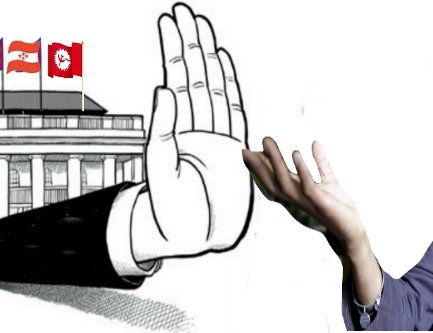There is much more to the Supreme Court’s recent overturning of the disqualification of decision of the Manipur Speaker, Yumnam Khemchand, of three MLAs ahead of the crucial floor test and election to the state’s lone Rajya Sabha seat in June 2020. This is the second time that the Supreme Court has had to intervene to overturn disqualification decision of the Assembly and it does not speak well for the state. More than the unfairness of it all from the vantage of observers outside the conflict arena witnessing the tussle for power where these below the belt punches are deemed as part of the game, the residual harm from such foul plays will certainly also damage the public perception of the law itself. When members of arguably the highest institution of democracy – the Assembly – who are given the responsibility of fashioning and making new laws so callously disregard the law, how can they expect the public to also be in any awe of the law. What we are witnessing in Manipur today is the idea of equality of all before the law being turned on its head. The consequences of this do not have to become immediately visible, but there can be doubt that it would have poisoned the larger public trust in the system which must predicate a healthy polity and society.
There is yet another revelation on the same day this news of the Supreme Court broke. The Governor of Manipur, La Ganesan, has also given his opinion that the 12 MLAs currently under scrutiny for disqualification for holding offices of profit as Parliamentary Secretaries, did not actually hold any office of profit. The question whether Parliamentary Secretaries are offices of profit or not is another question, and probably the dispute on the matter is unlikely to conclude just as yet, for the case of Parliamentary Secretaries has had other precedents in Meghalaya and Assam, and the conclusions there were just the opposite. However, the facts here in Manipur in the current case could be different and we are not going into this. What we do want to point out is the import of the old adage that “justice delayed is justice denied”. What kept the Governor’s office from communicating this opinion sought by the Election Office to conclude the case for almost an entire year? Relevant to this is also the fact this opinion is coming when the term of the current Assembly is on its final stretch of about three months. It is true the present Governor is very new and he canot be directly blamed for the delay but nonetheless the harm to the dispensation of justice is only too obvious. Even if opposition politicians were not satisfied with this opinion and wishes to challenge it, there would be no time left to do so. A final justice in the case therefore would necessarily be by compulsion, short-lived. To think that this is so because of the lapses, deliberate or otherwise, but most likely deliberate, of a Constitutional head is simply bewilderingly atrocious. Yet again, after all these, who can be expected to have any real esteem for the law of the land.
It is often said that there is no other way to define justice or freedom than by the law. Justice dispensation cannot be defined episode wise, dependent on assessments of emergent situations alone. Instead, it has to be defined within carefully structured norms that emerged from past precedents encapsulated into laws. Otherwise, there would only be anarchy with each and everyone coming up with their own notions and interpretations of justice. This is why it is imperative to first of all make good laws in which are factored needs of the time, peculiarities of the situation of the place the laws are being enacted for, as well as the universal understanding of “natural justice”. However, in equal measure this notion of “natural justice” must be balanced by the understanding of peremptory norms or jus cogen. Indeed, peremptory norms are in its peculiar way, integrally related to natural justice. Hence, if there are “natural justices” all humans must be entitled to, there must also have to be “natural injustices” which can have no excuses for their continuance. For instance, some societies may have gender inequality, or even slavery, as their ancient customs, therefore seen as “natural justices”. Relevant to this, Jus cogen says there are also must be practices classified as unconditionally wrong regardless of whether they form anybody’s ancient custom and seen as right within these cultural systems. Hence slavery, colonisation, gender oppression, child labour, piracy etc., are in the list of jus cogens by international consensus. No question about it that all modern democratic laws must keep by this norm, but it is also now considered imperative for customary laws to also not be exempted. It will be recalled, this was one of the thorny areas in codifying customary laws while United Nations Declaration of Rights of Indigenous Peoples, UNDRIP, was under preparation to be finally adopted by the United Nations General Assembly on September 13, 2007.
Manipur’s power elite of course have no use for all these laboriously evolved international understandings. At this moment, it does appear even its law makers are uninterested in the law and would without an afterthought break the very laws they make. Many others also seem to consider themselves as above the law. Something indeed is terribly rotten in the state of Manipur.












